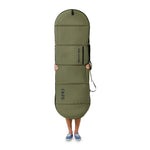Surfboards can look bulky, but are they surprisingly heavy? Let's take a look at exactly how much a surfboard weighs. We'll explore how the size, materials, and design of a surfboard all affect its weight and give you a ballpark idea of how much these boards typically tip the scales. Let's get into it!
The Importance of Knowing Your Surfboard's Weight
Surfing is all about balance, both in the water and on your board. Understanding the weight of your surfboard plays a very important role in mastering this balance. For example, a lighter board may offer more maneuverability and speed, ideal for high-performance surfing. On the other hand, a heavier board can provide stability and control for beginners or in larger waves.
Knowing your surfboard's weight allows you to make informed decisions when choosing the right equipment for your skill level and surfing conditions. It can impact how agile you are on the waves and how well you can navigate different swells. Additionally, being aware of your board's weight helps prevent fatigue during long surfing sessions, ensuring you can enjoy more time out in the water.
Factors That Affect a Surfboard's Weight
There are a lot of factors to consider when it comes to the weight of a surfboard.
- The type of materials used in construction plays a significant role. For example, foam boards tend to be lighter than traditional fiberglass ones. Polyester versus EPS foam have different weights. Although where most of the weight comes from, in traditional surfboards, is the type of resin used when glassing a surfboard.
- The dimensions of the board also affect its weight - longer and wider boards will naturally weigh more compared to shorter ones. Additionally, the thickness of the board can impact its weight as well.
- Additional features like fins and traction pads can add extra weight to the surfboard. Even the design and shape of the board can influence how heavy it is.
- Any repairs or modifications done to the surfboard over time can also alter its original weight. It's essential for surfers to consider these factors when choosing a board that suits their needs.
Average Weights of Different Types of Surfboards
When it comes to surfboards, weight plays an important role in determining how the board performs in the water. Different types of surfboards vary in weight due to their size, shape, and materials used in construction.
Shortboards
Shortboards, designed for quick maneuvers and high-performance surfing, typically weigh between 6 and 8 pounds. Their lightweight nature allows for increased speed and responsiveness on the waves.
Longboards
Longboards, known for their stability and ease of paddling, tend to be heavier than shortboards. On average, longboards can weigh anywhere from 10 to 15 pounds due to their larger size and volume.
Fish Surfboards
Fish surfboards strike a balance between shortboards and longboards in terms of weight. These wider boards with a swallowtail design usually weigh around 7 to 10 pounds, depending on their dimensions.
Foam beginner boards
Foam beginner boards are among the heaviest surfboard types as they are specifically designed for beginners who need extra stability while learning how to catch waves. These soft-top foam boards can range from 12 to 20 pounds or more, depending on their length and thickness.
Understanding the average weights of different types of surfboards is essential when choosing the right board that matches your skill level and surfing style.
How to Determine the Weight of Your Surfboard?
Here are simple methods to determine the weight of your surfboard:
First, you can check the manufacturer's specifications for your board, as they often provide the weight. If that information isn't available, you can use a bathroom scale at home to weigh your surfboard.
To do this, simply step on the scale holding the board and then subtract your own weight from the total. Another option is to take your surfboard to a local surf shop or shaper, which may have a specialized scale for weighing boards accurately.
Remember that knowing the weight of your surfboard is essential for choosing the right equipment and understanding how it will perform in different conditions. So don't hesitate to take the time to figure out this crucial detail before hitting the waves!
Tips for Reducing the Weight of Your Surfboard
When it comes to optimizing your surfing experience, the weight of your surfboard plays a crucial role. Having a heavier surfboard is not always a bad thing. It is important to know the type of surfing that you are looking to achieve! If you are looking to reduce the weight of your board, there are a few tips that can help.
- Consider the materials used in your surfboard. Opt for lighter materials like EPS foam or epoxy resin instead of traditional polyurethane foam and fiberglass.
- Another tip is to go for a minimalist design. Avoid unnecessary decorations or bulky additions that add extra weight without contributing much to performance.
- Additionally, keep your board clean and well-maintained. Excess wax build-up or water retention can add unnecessary weight over time.
- Be mindful of any accessories you attach to your board, such as leashes or fins. Choose lightweight options that won't weigh you down while riding the waves.
By implementing these tips, you can make sure that your surfboard remains light and agile for an optimal surfing experience.
Protecting Your Surfboard With Surfboard Bags

No matter the weight of your surfboard, investing in a surfboard bag is important for many reasons. These bags safeguard your board from damage, including dings, scratches, and exposure to sunlight, which can all affect your board's performance and longevity.
It doesn't matter if your board is lightweight or heavy; a surfboard bag ensures it stays protected. This protection is important not only for storage but also during transportation to and from the beach. A surfboard case also helps in maintaining your board's condition, keeping it looking new for longer.
If you have a heavy Surfboard a quality surfboard carrying case could help when transporting your surfboard to beach breaks or while on surf trips.
If you are looking for the best surfboard bags to purchase, FARO is your answer! Our bags offer extra protection and storage for your boards. We have different sizes of board bags that you can invest in with different colors. Take a look at FARO's collection today!
Conclusion
Finding the right balance for your surfing experience is another important factor. Knowing how much your surfboard weighs can have a huge impact on your performance in the water. By understanding the factors that affect a surfboard's weight and learning how to determine its weight, you can make informed decisions when choosing a board.
Remember that the weight of your surfboard should complement your skill level and surfing style. Whether you prefer a lighter board for maneuverability or a heavier one for stability, finding the perfect balance will enhance your overall surfing experience.





